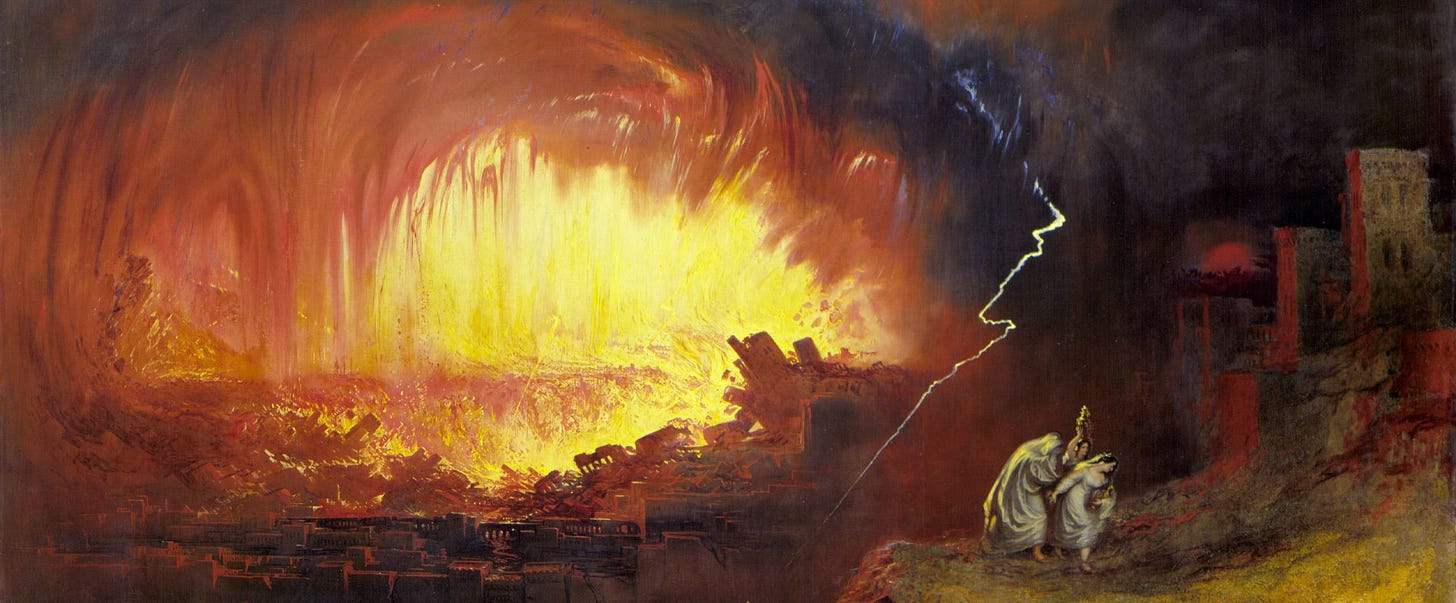Why does the Torah contrast the hospitality of Abraham against the wickedness of Sodom and Gomorrah?
It may be that the greater sin of Sodom was not that of sexual immorality but of an extreme lack of hospitality and extreme selfishness. At first glance, this may seem odd but hang in there with me.
“As I live,” declares the LORD, “your sister Sodom with her daughters have not done as you have done, you and your daughters. Behold this was the iniquity of your sister Sodom: pride, gluttony, and careless ease - so had she and her daughters-and she did not strengthen the hand of the poor and needy.” (Ezekiel 16:48-50)
According to the Rabbis, Sodom was an extremely wealthy city. They were so concerned about keeping their wealth that they passed laws forbidding foreigners from entering their city unless the travelers were already rich. Even then, they were treated with suspicion and made to feel like second-class citizens. (See Genesis 19:9 - Lot was considered an outsider, even though he was extremely wealthy)
The extreme hoarding of wealth resulted in heinous acts of wickedness by the city’s people. When the townspeople surrounded Lot’s home demanding to have their way with his guests, it may not have been out of extreme lust that they desired to commit these acts but to shame the men, to debase them such that they would realize they now belonged to the city. Their desire was to dominate, subjugate, and take them as property.
In the Jewish Midrash, we find more examples. For instance, the people of Sodom would set their sights on wealthy travelers and offer them a place to sleep in areas along the city walls they knew were flimsy. At night the people would push the wall on the travelers to kill them, then rush in and take their property.
We also read an alarming story in the Gemara. A young woman would take bread out to the poor people in a pitcher so the people of Sodom would not see it. When the matter was revealed, they smeared her with honey and positioned her on the city wall, where hornets came and consumed her. And that is the meaning of that which is written: “And the Lord said: Because the cry of Sodom and Gomorrah is great [rabba]” (Genesis 18:20). Sefari.org
Jesus agrees with the traditional Jewish understanding of the sin of Sodom. We read in Matthew 10:11-15,
Whatever town or village you shall enter, find out who in it is worthy and stay there until you leave. As you come into the house, greet it. If the household is worthy, let your shalom come upon it. But if it is not worthy, let your shalom return to you. And whoever will not receive you or listen to your words, as you leave that house or that town, shake the dust off your feet. Amen, I tell you, it will be more tolerable for Sodom and Gomorrah on the Day of Judgment that for that town."
Why does Jesus compare the sin of Sodom and Gomorrah to the lack of hospitality the disciples may experience on their journeys? Because the sin of not showing hospitality to strangers is grave. It is an extreme manifestation of the priority of “self.” He would not have compared the two were this not so.
In Pirkei Avot 5:10, the Rabbis tell us that the character trait that dominated Sodom and Gomorrah was, “What’s mine is mine, and what’s yours is yours.” At first glance, this seems innocent enough. However, there is something much more sinister going on here. This motto represented extreme selfishness that found its roots in monetary wealth. In other words, everything I have is mine, and everything you have is yours. I won’t help you, and you won’t help me. We only look out for ourselves.
The righteous person carries with them a different mindset: “What’s mine is yours and what’s yours is yours.” (Pirkei Avot 5:10). This means that the righteous give freely, knowing that the Divine Creator provides abundantly for those who give, not only of themselves but of their possessions as well. In a society where this mindset is promoted, accumulating wealth is encouraged because the righteous give freely and don’t allow society to devolve into depression and chaos.
In Sodom and Gomorrah, the only thing that mattered was the individual. Hoarding wealth and looking with disgust upon the downtrodden were celebrated. They treated outsiders with extreme cruelty, fearing they would take away their resources. The numerous sins of Sodom are rooted in this selfish worldview. Selfishness led them to look upon other human beings as possessions and property to abuse.
Affluence, combined with extreme selfishness, leads to the devolution of mankind. It leads to chaos. The exultation of the self distorts reality such that the truth is unrecognizable, and the dehumanization of the other is celebrated.
As a nation, we are on the path to chaos. We may already be there. For instance, abortion is the complete elevation of the self over the other. The degradation of the male and female body with the promotion of gender transition surgeries on minors represents a distorted search for self. Men self-identifying as women, and vice versa, make it evident that the “self” has been elevated to the level of Sodom.
Abrogation of the self is the way to restoration. Rabbi Shaul (Paul) writes in Philippians 2:3,
Do nothing out of selfishness or conceit, but with humility consider others as more important than yourselves, looking out not only for your own interests but also for the interest of others.





